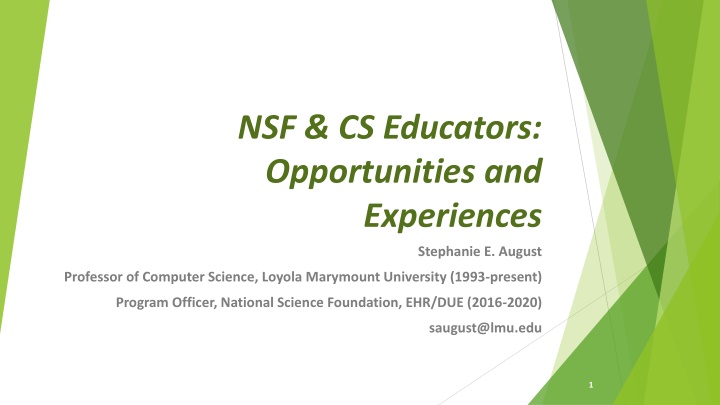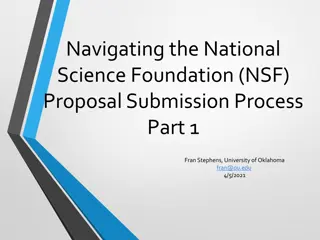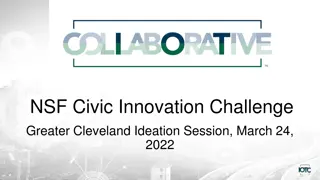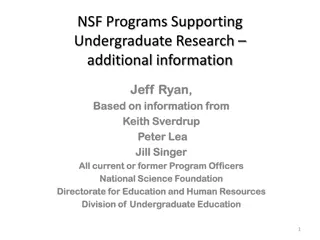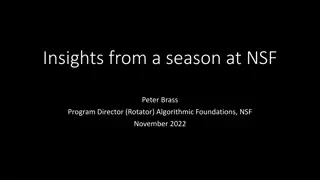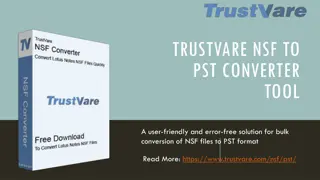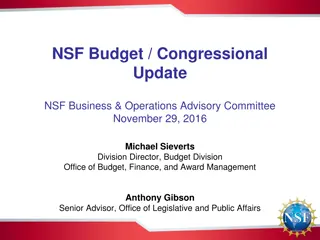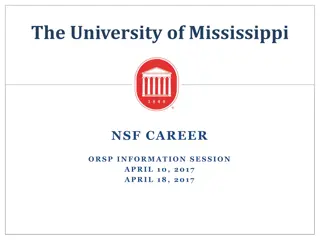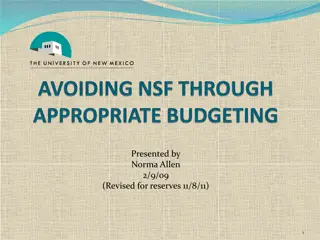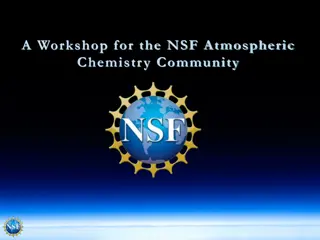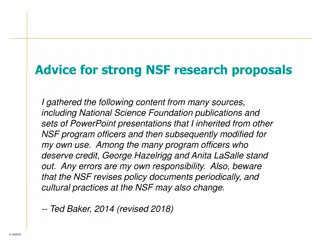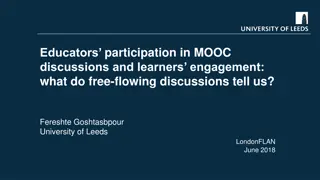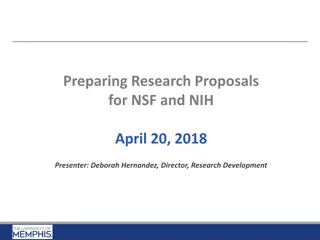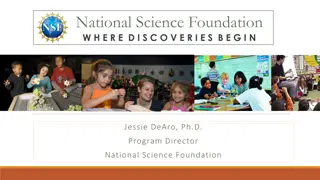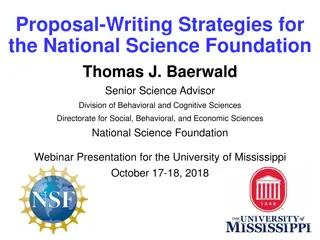Insights for NSF & CS Educators
Stephanie E. August shares valuable advice for educators looking to make an impact in the fields of computer science and education, including tips on mentorship, funding opportunities, and navigating the NSF system.
Download Presentation

Please find below an Image/Link to download the presentation.
The content on the website is provided AS IS for your information and personal use only. It may not be sold, licensed, or shared on other websites without obtaining consent from the author.If you encounter any issues during the download, it is possible that the publisher has removed the file from their server.
You are allowed to download the files provided on this website for personal or commercial use, subject to the condition that they are used lawfully. All files are the property of their respective owners.
The content on the website is provided AS IS for your information and personal use only. It may not be sold, licensed, or shared on other websites without obtaining consent from the author.
E N D
Presentation Transcript
NSF & CS Educators: Opportunities and Experiences Stephanie E. August Professor of Computer Science, Loyola Marymount University (1993-present) Program Officer, National Science Foundation, EHR/DUE (2016-2020) saugust@lmu.edu 1
Good or bad advice? 1) Join a department with a strong old-boys network. 2) Find a mentor other than your department chair. 3) An NSF research grant from the Computer and Information Science and Engineering (CISE) Directorate and not the Division of Undergraduate Education (DUE) in the Education and Human Resources Directorate (EHR) will help you get tenure. 4) NSF program officers are minor deities to be feared. 5) Reviewing for NSF requires a lot of time and is not worth the effort. 6) NSF is a typical bureaucracy. 7) Become an NSF program officer late in your career. 8) A program officer s work load is lighter than a faculty member s. 9) Being a program officer is like sitting on the top of the world. 10) Having children before earning tenure works. 2
Join a department with a strong old-boys network. if you identify with the boys. if the boys treat you as one of their own. OR You develop strong ties to people in other departments* You collaborate with people at other institutions* You build your own network* Choose the position aligned with the most important aspects of your life. * You should anyway. 3
Find a mentor other than your department chair Mentors are everywhere. An official relationship is not required. Potpourri is good. An unofficial support group is a necessity. A sampling of mentors: PhD advisor Program officers Faculty in other departments Vice president for international affairs College presidents 4
You need to have an NSF research grant grant from CISE or was it EHR/DUE? Pick a problem of interest, formulate a question, rescope your work. Find a collaborator. Involve students in the research. Identify a project, then identify a funding opportunity respond to it. Tailor the proposal to a particular funding opportunity Fund the students - and yourself, of course! Follow your heart. Have fun. Be enthusiastic. Always listen, then follow your own judgment. Win an award and participate in PI meetings* Publish in the journal/conference you need to publish in to advance. * PI meetings are the best part meet others, find collaborators, get ideas, network 5
NSF program officers are minor deities to be feared. Actually, Program Officers* (POs) are just like you, me, and the others. They want you to succeed. They are really busy. Email a request to one PO to schedule a phone conversation about the project. Send the PO a one-pager (project summary) a few days before the call. Call the program officer at the appointed time. Give an elevator pitch, ask specific questions, solicit feedback. Plan to spend 17 minutes on the phone. * Program officer | manager | director it s all the same. 6
Reviewing for NSF requires a lot of time and is not worth the effort. It does require a lot of time (2-8 hours/proposal) Where else would you get a chance to read actual proposals submitted to your target funding opportunity? How else would you find out how reviewers really analyze proposals? When do you have an opportunity to discuss potentially transformative ideas? Travel expenses are covered for face-to-face panels (use the NSF travel agency!!!) Remember to set up an appointment with target POs when you are in town. Let POs know you are available to review. 7
NSF is a typical bureaucracy. Nice it. It is an organization with standard operating procedures. If everything is an exception, chaos (and favoritism) reigns. Remember the mission, learn the reasons, legislation, regulations. Avoidance of appearance of Conflicts of Interest is essential. Just figure out the rules and follow them. Be respectful and diplomatic if an exception is needed. Appreciate the staff that need to support day-to-day operations. Keep good notes and follow up. Set agendas, record minutes, store them in a shared space. 8
Become an NSF program officer late in your career. Many do. Many more use it as a spring board to a new position. Others bring their knowledge back to their institutions Awareness of future trends National view of the field Network of contacts Ideas to introduce into the classroom, rejuvenate the institution How to compose an intelligible budget justification or write a winning proposal. You can serve more than once! DC does have schools just bring the family on an adventure. 9
A program officers work load is lighter than a faculty member s. This all depends upon your current workload and your current work habits. A PO reads proposals, bins proposals, recruits reviewers, runs panels, makes funding decisions, writes up awards and declines, manages awards, attends meetings, mentors new hires, responds to requests for information, interacts with Pis, contributes to solicitations There are many opportunities to Become involved in cross-directorate projects Sit on working groups that collectively develop solicitations and manage programs Perform outreach Participate in PI meetings, workshops, symposia Remember to Visit museums and national monuments Go on urban hikes Visit distilleries and breweries 10
Being a program officer is like sitting on the top of the world. This is an opportunity to be a part of the future. It is an amazing experience in a positive working environment. You are surrounded by top scientists, engineers, sociologists, economists, visionaries. The ones you aren t surrounded by every day come and give talks. You learn about institutions, people, and places you didn t know existed. You become aware of different perspectives and issues, and various publications Common Guidelines for Education Research and Development Companion Guidelines on Replication &Reproducibility in Education Research The 2010 User-Friendly Handbook for Project Evaluation 11
Having children before earning tenure works. Follow your heart, consider your limits Have children when you want them if you can deal with some chaos. Triage. Make it work. Remember that work expands to fill the available time. Rather than prepare the perfect lecture, work examples in class. Students learn more that way anyway. Don t criticize yourself other people are quite willing do that for you. Kids will come out fine if you are fine. Accept help. Learn how to throw a chicken sitting on broccoli and carrots in the oven and put the rice cooker on while the kids wash their hands after school. 12
Thank you. Enjoy your careers. Remember to smell the roses. Stephanie E. August saugust@lmu.edu 13
